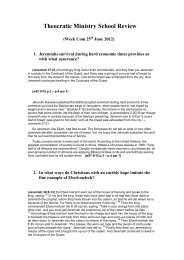1964 Awake! - Theocratic Collector.com
1964 Awake! - Theocratic Collector.com
1964 Awake! - Theocratic Collector.com
You also want an ePaper? Increase the reach of your titles
YUMPU automatically turns print PDFs into web optimized ePapers that Google loves.
the best guide is God's Word. "It does not<br />
belong to man \vho is walking even to direct<br />
his step." Further, children are like<br />
vjnes that need to be trained and pruned<br />
to be<strong>com</strong>e fruitful: "Foolishness is tied up<br />
with the heart of a boy; the rod of discipline<br />
is what will remove it far from him."<br />
-Ps. 111:10; Jer. 8:9; 10:23; Provo 22:15.<br />
Its Basic Flaws<br />
In view of the foregoing it is not surprising<br />
that "progressive education" developed<br />
many flaws. So rriany, in fact, that in<br />
time Dewey himself lashed out against the<br />
extremes to which some carried his "progressive<br />
education."<br />
One basic flaw of "progressive education"<br />
is the great challenge it presents to<br />
the teacher as to her abiJ]ties, her skills,<br />
her resourcefulness, her integrity, her<br />
good judgment and her dedication to the<br />
teaching profession. Apparently few teachers,<br />
relatively speaking, have the stature<br />
to meet this chDllenge successfully.<br />
Another basic flaw is confusing work<br />
with play. It may be more enjoyable to develop<br />
muscles by play than by work, but it<br />
certainly is not more efficient. Likewise,<br />
to develop intellectual power efficiently<br />
takes more than play; it takes work.<br />
Closely related to that flaw is the excessive<br />
stress on appealing to a pupil's interest.<br />
True, things are learned more easily<br />
that way, but, judging by the results, it is<br />
obvious that more than self-initiated interest<br />
is required if pupils are to master<br />
the "three R's," Making learning interesting<br />
was given precedence over what was<br />
being learned, which was like putting the<br />
cart before the horse. The failure of traditional<br />
eduea tion to make learning sufficiently<br />
interesting was not nearly as serious<br />
a flaw as that of greatly watering<br />
down learning for the sake of making it<br />
interesting.<br />
10<br />
Still another serious flaw of "progressive<br />
education" is automatic promotion on<br />
the premise that it gives a pupil an inferiority<br />
<strong>com</strong>plex if he is left behind. But<br />
does he feel any less inferior if he is unable<br />
to keep up with the rest of his class? No<br />
doubt this failure to solve the problem<br />
largely accounts for so many "dropouts,"<br />
pupils quitting school before <strong>com</strong>pleting it.<br />
Automatic promotion merely denies the<br />
existence of failures, it does not remedy<br />
them, and it causes a diploma. to be nothing<br />
more than a Certificate of attendance.<br />
Crediting the child with too much wisdom<br />
is another serious flaw of pl'Ogressive<br />
education, It would teach him democratically,<br />
as though he were an adult; it encourages<br />
self-expression when he has nothing<br />
to express, allows him to elect subjects<br />
when he lacks the wisdom for it. A child<br />
needs to be told what is for his best. The<br />
stress of "child-centered" education has all<br />
too often resulted in a child-dominated<br />
education.<br />
Paradoxically, "progressive education,"<br />
while overestimating the child's wisdom,<br />
underestimates his intellectual capacity.<br />
With its theories of "readiness" and permissiveness,<br />
the child is actually held back<br />
by a policy of postponement, pampering<br />
and spoon-feeding. A child can be taught<br />
to read at five jf not before, but Dewey<br />
re<strong>com</strong>mended waiting until his seventh or<br />
eighth birthday. Representative of the attitude<br />
of many of his foIlowers is the remark<br />
of one of them when asked about<br />
teaching five-year-olds to read and write:<br />
"Oh, we don't bother about that too much.<br />
We know they'll be alright when they're<br />
eighteen." But are they?<br />
Confusing the child's basic needs with<br />
his desire,., lS another serious flaw of "progressive<br />
f'ducation." How can a child know<br />
what are his basic needs? His teachers<br />
must awaken these in him. Going hand in<br />
hand with catering to the child's desires<br />
AWAKE!




